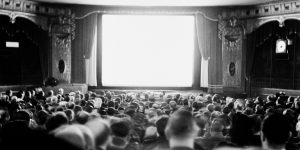
However, Barthes argues, it is not sufficient to merely reflect on your affair with the film – instead, a successful cinematic experience would ensure that the film possesses you, to the point where your gaze is stuck on the screen and nothing else can call to your attention. Only then, when you leave the movie theater, will you face a powerful shift in reality: the outside world will slowly but surely strip away any remaining cinematic imagination, and instead leave with you the mundane discontents of your life.
When sitting in a movie theater, alone or not, in the hushed silence after the trailers play but before the film reel starts, it is natural to ease into the entrancing and almost magical atmosphere. In that split moment, in the dark deafeningly silent room, only you and the expansive lit-up screen in front exists. This is where “the body’s freedom is generated”. Sure, you can argue that the hypnosis formally attached to cinema halls can now apply to many more experiences, with the rise of easily accessible tv shows and movies growing, all at the comfort of your couch. But, this “diffused eroticism” can only be found by the spectators in a movie theater, where the audience is elevated and removed from their world. We seek the comfort and pleasure of being enveloped in different realities, to the point where we can detach ourselves and leave everything behind in the large, dark room.
By: Saima Abidi (UID: 3035552856)